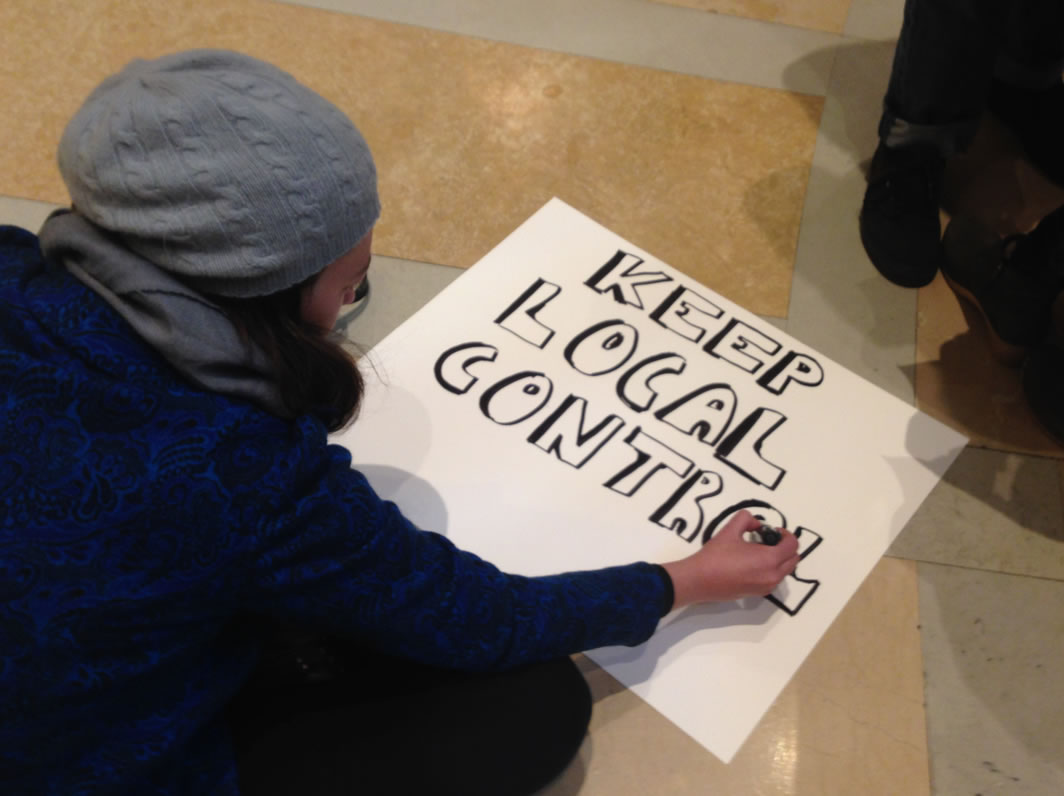

Share
The debate over higher wages and paid sick time won’t end with Thursday night’s vote by the Minnesota House, workers said. They vowed to keep organizing – all the way to the ballot box.
The House voted 76-53 to pass a preemption bill that bars local governments from adopting measures to improve workplaces. It included a provision to retroactively rescind the earned sick and safe time ordinances passed by the cities of Minneapolis and St. Paul, depriving 150,000 people of paid leave when they are ill or need to care for a loved one.
The Republican-controlled Senate still must vote on the bill before it can go to Governor Mark Dayton, who is likely to veto it.
Proponents “better start dusting off their resumes, because they are going to be out of a job,” said Katie Drahos, a member of Neighborhoods Organizing for Change and the Activated Artists Coalition.
Drahos is among thousands of people – workers, employers, faith and community leaders and others – who worked through lengthy processes at the local level to reach compromises on the earned sick and safe time ordinances. Many of them filled the corridors of the state Capitol Thursday as they saw that progress threatened. Many stayed in the House gallery, even after the Republican-controlled House delayed the vote for two hours.
Rep. Pat Garofolo, R-Farmington, author of the preemption bill, said it “simply conforms to what we have done for over 100 years.” He said the measure is needed to prevent “a patchwork of laws” that would be confusing for businesses.
The law is broadly written, prohibiting communities from adopting, enforcing or administering “an ordinance, local resolution, or local policy requiring an employer to provide an employee a particular benefit, term of employment, or working condition.”
Opponents argued the law is bad on two main counts – it restricts the power of citizens at the local level and it undermines gains that have been made. They also said it ignores a key issue – local governments must act when the state won’t.
“If this Legislature had acted on [issues such as paid sick time], there would be no need for local governments to take these actions,” said Rep. Frank Hornstein, DFL-Minneapolis.
“I worked long and hard – almost two years – to get the earned sick and safe time ordinance passed in St. Paul,” said Arline Datu, a member of the faith group, ISAIAH. She described how the legislation would help her children, who currently do not get paid sick time in their jobs.
“This bill is a clear attempt to silence the communities of color that have been relentlessly organizing for paid sick time and higher minimum wages in an effort to close our worst-in-the-nation racial disparities,” said Rod Adams, an organizer with Neighborhoods Organizing for Change. “This bill comes straight from corporate lobbyists to take power away from communities of color and give it to corporations. But we will not be silenced.”
The vote came after hours of debate that included several amendments offered by DFLers who sought to incorporate paid sick leave, fair scheduling and other provisions. None of the amendments came to a vote, as their authors, saying they had made their point, withdrew them in face of the Republican majority’s opposition.
“Someone has to stand up for workers,” said Rep. David Bly, DFL-Northfield, who introduced the fair scheduling amendment. “What we have seen in recent history is an assault on workers … in a large degree under the influence of the powerful lobbyists organized by the Chamber of Commerce.”
Other DFL legislators amplified that point, with some noting the preemption bill is modeled on one written by ALEC, a conservative, anti-union group.
“You’re a cog in the corporate wheel – that’s the message you’re sending the people of Minnesota if you pass this bill,” said Rep. Paul Thissen, DFL-Minneapolis.
Proponents of the legislation only care because “people are starting to win at the local level,” he said.
“To take away the power of local municipalities – I can’t believe the Republicans are doing this!” said Rep. Rena Moran, DFL-St. Paul. “Why are we silencing the voices of local control now?”
The debate also brought forward a bitter truth – that Minnesota’s economy, while prospering from many, is leaving behind many others. Through campaigns like the $15 minimum wage effort in Minneapolis, low-wage workers are mobilizing to improve their lives.
“This [legislation] is all about an attack on the working poor – and most often the working poor are people of color,” said Rep. Susan Allen, DFL-Minneapolis.
Rep. Mary Kunesh-Podein, DFL-New Brighton, said the preemption bill reminded her of another time that power was stripped from workers. “When the freed slaves gained power during Reconstruction, the rules were changed,” she said.

